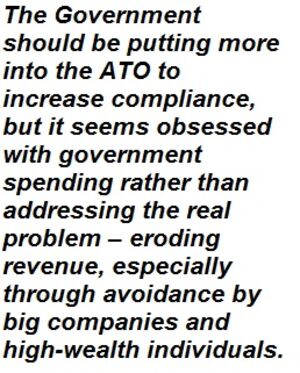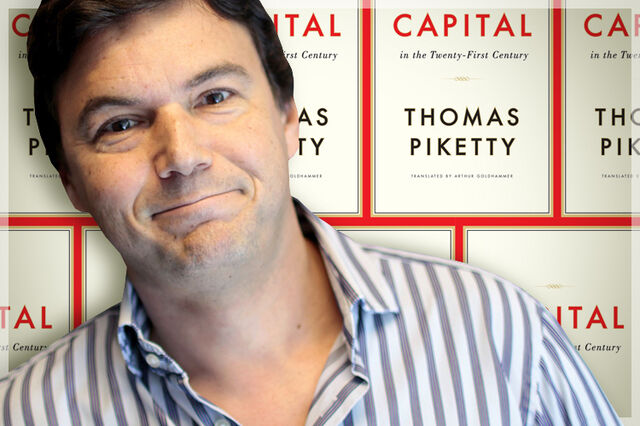
Piketty's tax ideas would be good for Australia
Piketty's tax ideas would be good for Australia
Friday October 24 2014, 10:00am
IT SHOULD not need a Senate committee investigation to expose Australia’s corporate tax avoiders. That is why you have an Australian Taxation Office.
But over the past few years the ATO has come under a lot of strain with foolish staff cuts.
We should count our blessings that we have a fairly good tax system; a pretty efficient tax bureaucracy; and a fairly high degree of tax compliance. These are all unnewsworthy things so you do not hear about them much.
But they are precious things and we should not jeopardise them by more cuts to the ATO’s staff and Budget.
The ATO has lost about 6 per cent of its staff over the past year from 24,740 at the time of the capacity review last year to 23,259 as at June this year. The cuts are a false economy.
Consider that the ATO collects more than $300 billion in net tax plus $11 billion in compliance revenue for an outlay of a tad over 1 per cent of that -- $3.4 billion.
It is also the custodian of $323 million from the superannuation guarantee charge. It also paid $8.4 billion in transfers and payments and has retrieved $5.5 billion of lost superannuation for more than 1 million people.
It fields about eight million phone calls a year, half a million shopfront visits and 5.5 million pieces of correspondence.

The Government should be putting more into the ATO to increase compliance, but it seems obsessed with government spending rather than addressing the real problem – eroding revenue, especially through avoidance by big companies and high-wealth individuals.
Last year the ATO came under fire for falling behind in information technology. But it takes time, people and money to keep up with comparable countries. Information technology is an investment, not “wasted” government spending.
At the bottom end of the scale, we are seeing the ATO use technology to access the bank accounts of individual taxpayers and pick up on interest paid to them. That technology is scooping up revenue that might otherwise be lost as hundreds of thousands of taxpayers used to forget to add it as income.
So one might well ask why can’t the ATO use similar technology to check transfers by large companies to accounts in low-tax places like the Cayman islands?
But as well as a better resourced ATO, we need some legislative determination to close the loopholes that allow companies to avoid paying tax on their Australian revenues by deducting interest and other expenses incurred outside Australia, and to close down arrangements that allow corporations operating in Australia to use low-tax jurisdictions to avoid tax.
The more the ATO gets stretched, the greater is the danger that we go down the Greek road. In Greece, the tax bureaucracy and law is so ineffectual that paying tax is almost optional anyone in business.
At present, aside from some big corporations, Australia has a culture of compliance. It is encouraging to hear people like billionaire retailer Gerry Harvey say that it is “immoral” not to pay appropriate tax in the country where you earn an income.
The danger occurs when a tax bureaucracy gets so stretched that some income earners sense that the chances of getting caught cheating become so low as to be ignored. Then ethics and morality become the only means of compliance, and they are simply not enough to ensure the revenue base.
The legislative task is unremitting. Every time the legislation is changed to close one loophole the high-wealth individuals and big corporations find others.
A smarter government, however, would go beyond compliance. It would widen the tax base. French economist Thomas Piketty has called for a wealth tax. He says it need only to be set at a very low rate to generate significant revenue so that governments can meet the costs of an ageing population. It would also help reduce rising inequality which imposes burdens on the whole society -- rich, moderately comfortable and poor.
Australia has very few wealth taxes. Nearly all our taxes are imposed upon transactions – the earning of an income; the purchase of goods and services; the selling of a capital item; the act of gambling; the transacting of a dutiable contract.
About the only wealth taxes we have in Australia are land taxes and that is restricted to income-generating land in all jurisdictions other than NSW.
Piketty argues that wealth assessment is fairly easily done. People usually hold wealth in secure, identifiable ways: shares, bonds, real property and the like. The security of all this property is dependent on the legal and bureaucratic systems paid for by us all, so those who benefit most from those systems (say, people who own more than $10 million) should contribute more to their upkeep.
Another obvious source is Australia’s $2 trillion in superannuation funds. The funds get huge tax benefits. Fund managers take about $20 billion in fees a year for usually doing no better than the market. “Spoilt brats”, former Treasurer Peter Costello called them.
Instead of restricting taxes to earnings, the Government should tax the whole wealth of the fund. At just a half of one per cent on the $2 trillion that would raise $10 billion a year.
DOT DOT DOT
I had a spirited discussion last week with a geology PhD candidate. She was bemoaning her university’s cost-cutting by increasing class sizes and reducing the number of tutorials she teaches, making it even harder to get by on the PhD living allowance of $25,392.
I muttered something about other part-time work and that I drove a truck to put myself through law school.
That earned the retort that undergraduate learning is different. You are getting a degree to earn a bigger income and that the process is all one way – knowledge and understanding from university teachers to students.
PhD students, on the other hand, produce original research which goes into the national research effort and is picked up and used by industry and other researchers.
Her $25,392 was not a student allowance, she said, but her pay, and it should be higher.
I couldn’t help but agree –especially in the field of geology.

